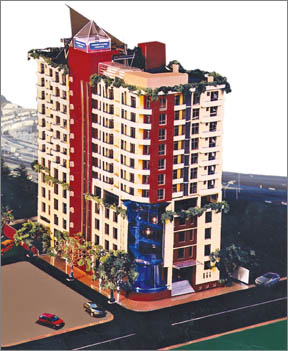Colombo's high-rise will outgrow economic bounds
by Elmo Leonard
Colombo's in-vogue concept of condominium or high-rise living, will
face the challenges of shortages of water, electricity and sewerage
disposal in the near or longer-term and needs remedial action.
 If not implemented, the lives of the tenants or owners will become
unbearable, while the property developers will no longer want to build
high-rise buildings, chartered town planner, Prof. Ashley Perera said. If not implemented, the lives of the tenants or owners will become
unbearable, while the property developers will no longer want to build
high-rise buildings, chartered town planner, Prof. Ashley Perera said.
High-rise buildings in Singapore and Malaysia are linked to adequate
supplies of water, electricity and sewerage. If such infrastructure is
not met here, this late 20th century Colombo-phenomenon, will move out
of economic bounds for developers, Prof. Perera said.
Besides, the Sri Lankan culture is not capable of affording a
noise-free and peeping tom-less atmosphere essential for high-rise
living. The developers have to provide large parking and recreation
spaces which dilute the economics of building higher.
Colombo's water supply is obtained by tapping the Kelani river at
Labugama and Kalatuwawa. The over-dredging of Kelani river sand, has in
times of drought sent sea water up-river, halting the purification of
water for human use.
The pressure of Colombo's water supply is often insufficient to go up
a few floors, and large pumps must be employed to provide a continuous
flow of water; a 40-level condominium in Colombo 4 is in the pipeline,
being a BOI, India-Sri Lanka collaboration project.
The collapse of three and four level buildings in India is now
common, while some high-rise buildings are being built under Indian
collaboration. It would be gainful to make sure that high-rise buildings
coming up here will not collapse, Prof Perera said.
The high-rise buildings being constructed are aimed at high-income
groups and does not address the problem of housing for the low income
class.
Prof. Perera said that he will not recommend the building of
high-rise buildings for living, in Colombo. Rather, he urged the
authorities to study the problems the tenants of high-rise buildings
would face, and address such issues, before more such buildings are
allowed to be built.
Watercuts are common in Colombo, while a reliable water supply source
must be made available, to cater to such demand, Prof Perera said.
Singapore imports its supply of water, coming from a Malaysian
region, sparsely populated. Yet, Singaporean residents are discouraged
from long term, total dependence on pipe borne water for fear of
contracting water-related diseases, Prof Perera said.
The same reality of weaning away from tap water for drinking applies
in other parts of the developed world and often, artificially sweetened
mineral waters are commercially available, nearby.
Singapore is now building a large water recycling plant.
Colombo knows no plans for water recycling, common in the developed
world, and highly developed in USA, where human-used water is recycled
many times, before it is allowed to flow out.
The same source of water is used in Colombo for drinking and washing
cars; a luxury denied to the developed world.
Tapping the ground water of Colombo's suburbs is no longer hygienic,
bearing growing populating density where human waste readily enters
ground sunk wells, through natural water springs.
In two years Prof Perera lived in a flat in London, he experienced no
electricity failure; in Colombo, the power cuts are frequent. A power
cut could lead to people being locked up in lifts. Also, most people
living in condominiums do not like to climb over ten floor levels. An
electricity fallout could prevent pumping water while sewerage disposal
is dependent on water.
The high temperature and humidity of our country is not conducive for
high-rise living in Colombo, for if the electricity fails, air
conditioners go out; the temperature of a condominium could then make it
uninhabitable.
The capacity of electricity supply must be constant and not
fluctuate, as it does here. There must be a higher voltage for
industrial areas and lower electricity capacity for homes.
Colombo's sewerage system, well over 100 years old, has not had its
capacity increased during this time and is on the verge of breakdown.
A private sewerage system to facilitate high-rise buildings would be
very expensive. Insufficiently treated, or raw sewerage is disposed into
the sea at several points. Condominiums must take sewerage system into
contention.
Kirillapone in Colombo is out of sewerage bounds while only 80
percent of Colombo's land area is linked to sewerage disposal.
Peeping tomism is known to be common in the Narahenpita flats,
Colombo 8, for instance. Noise associated with the Sri Lankan society is
unconducive for students to study. In Hong Kong, where high-rise
buildings is the norm, many thousands of students study inside its
airport, with no fee levied. In Sri Lanka there is no such private place
for student study.
The decentralisation of trade in Colombo, with the opening of the
economy in 1977, lead to shopping centres being established in
multi-storied buildings, Kiribathgoda and Nugegoda leading the list.
Decentralisation of Colombo's commercial areas was also hastened due
to the influx of cars, and consequent crowding of the city's parking
spaces. Main Street, Pettah, Colombo 11 is one of the main areas which
underwent trade decentralisation, losing its retail consumer durable
market to the suburbs. It is with the success of shopping condominiums,
that high-rise living in the metropolises came into vogue, Prof Perera
said.
No long-term study has been done on high-rise buildings in the city,
which are sold to the occupiers. What would happen in the event that the
water system or plumbing, breaking down? Who will maintain it? In the
event of a condominium having to be demolished and some tenants do not
agree to restructuring, a host of problems will surface.
[email protected]
|
